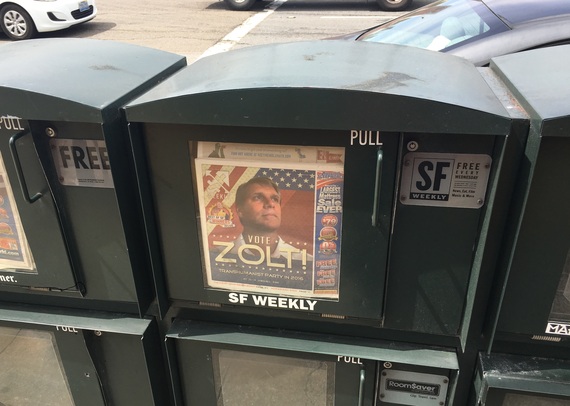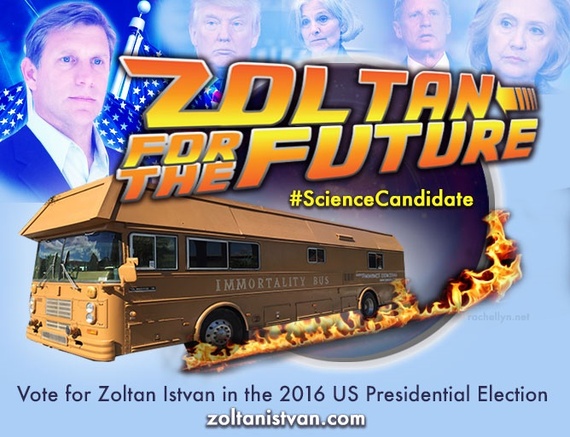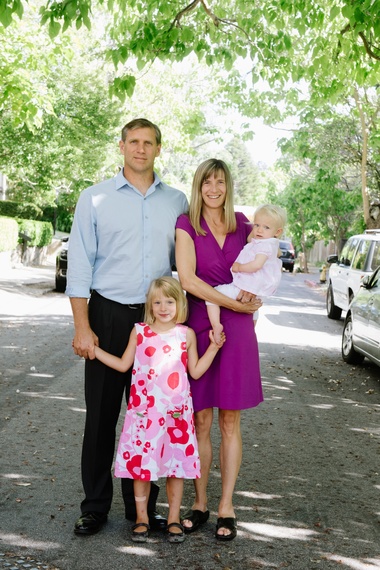
A recent cover of SF Weekly -- Photo by Transhumanist Party
Recently, thinker and writer C. JoyBell C., interviewed me about transhumanism and my growing 2016 US Presidential campaign. I wanted to share the interview below:
C. JoyBell C.: Today I would like to introduce you to someone you may already know, US Presidential Candidate, Zoltan Istvan. I am of course very glad to be able to interview a candidate for the Office of the President of the United States and I have found him to be a simple person with an understated way of explaining and describing himself and his platform. Simplicity is refreshing in this day and age, and I think a quality of good value.
Zoltan Istvan was born in 1973 and is the author of The Transhumanist Wager. He is a futurist, a philosopher and a transhumanist. He is also a conservationist, journalist and a writer. As a reporter for National Geographic, he covered the crisis in Kashmir, which was later made into a documentary. Zoltan also writes articles for Vice, Newsweek, TechCrunch, Salon, Slate, Psychology Today, Huffington Post and other publications.
He is husband to Dr. Lisa Istvan (ObGyn), with whom he has two beautiful daughters.
Zoltan is well-known as an atheist, which is not the totality of his person, nevertheless, is often a remarkable distinguishing element that people quickly take notice of. Those who know me, will probably immediately say, "Then why would you support an atheist candidate when you are anything but atheist?" Notwithstanding, I am actually in favour of the idea of having a President who does not represent any one form of spirituality. I don't need to see my own spiritual beliefs reflected by my President.
The Transhumanist Party slogan is, Putting Science, Health and Technology at the Forefront of American Politics. I think that anyone who is familiar with my work, would question my endorsement of such a slogan and wonder, "Why would an esoteric writer want to put science and technology at the forefront of her choice of politics?" Nevertheless, I am one of those few people who truly see no conflict between science and spirituality. The majority of people always see conflict between the two, while I happen to be of the minority that sees coherence and harmony between science and spirituality. In my eyes, there is such a flow and there is no fight. You could say that I am equally supportive of science, as I am of the mystical. The corporeal is equally important to the incorporeal.
Below is the interview in its entirety, please enjoy it and learn more about a man who would like to lead a nation:
Before anything else, I would just like to thank you for having this interview with me; it is an honor to interview a US Presidential Candidate who is also the individual at the forefront of transhumanism in the United States. I am very glad and I welcome you to my reader base, as well as to my friends and colleagues. We will all be glad to hear from you and to learn more about you.
I would like to begin this interview quoting your own words. I actually have these words up in my personal FB account's description of my political ideology. I just think that it speaks so much and so clearly, not only of the situation that we are all in, in the world today; but also of how our priorities are so obvious and yet for some reason, so difficult to address. You said, and I quote, "Government funds some medical and science research, but currently, that funding (in the US) is about 10 times 'smaller' than funding for defense, wars, and bomb making. This is a tragedy that we fight wars against human beings--and not against cancer, or heart disease, or Alzheimer's, or even aging. This is a primary reason transhumanists must organize into a movement, so that we can battle the powers that be, and demand much more government funding go directly into science and medical research." This is something that I wholeheartedly agree with. But then it's something that every human being should easily be able to wholeheartedly agree with. In this light, why do you think that transhumanism as a political ideology lacks the attention that the more popular political parties seem to take as a given?
Zoltan: I don't want to criticize religion too much, but we live in a Judeo-Christian culture that for centuries has taught us it's okay to die, since there's an afterlife. This of course also applies to war and a culture's feelings about going to war. I don't believe in God. When people die, they return to dirt. So until we have a more secular culture that realizes that death is a final thing, we won't be too worried about it. We'll feel like the military is more important than medicine.
C. JoyBell C.: For those who are hearing about transhumanism for the very first time, could you please explain transhumanism as a political ideology and also as a philosophy? How do the politics and the philosophy itself differ, if they do differ at all?
Zoltan: Transhumanism is a social movement of a few million people around the world who want to use science to radically modify the human being and the human experience.
As a political movement, we aim to get governments to approach problems with scientific and technological solutions. Most governments approach problems from a social, religious, or historical point of view.
C. JoyBell C.: Many people--when they think about American politics--immediately think about just two political parties--liberal and conservative; Democrat and Republican--I think that many are actually unaware of the fact that other parties, like the Transhumanist Party, do exist! Why do you think that this is the case? And what do you think can be done in order to show people that there is in fact a divergent path? Because that's what I think transhumanism is. I think it's divergent.
Zoltan: I think the Republicans and Democrats have done a superb job of monopolizing the political field. Unfortunately, that's also been a large disservice to America and what America stands for.
This election cycle in 2016 is unique as 3rd parties are getting more attention. The key is dissatisfaction with politics as usual, and that's when something like the Transhumanist Party can break out. And we are. We're growing like wildfire in impact this year.
C. JoyBell C.: Are we all headed to a transhumanist future, anyway? Let's put it like this, whether I like it or not, am I headed towards a future where artificial intelligence will look just like any other human being, and where robots will be taking over the economy?
Zoltan: Yes, I think we're all headed to a transhumanist world. Of course some won't want to join, but it's sort of like the internet. If you don't use the internet, then you are missing out on a major piece of the new world. Transhumanism will be like that. Without upgrading your bodies, you'll be totally left behind, both intellectually and physically. Can you imagine if you're the only one in 50 years who doesn't have a bionic eye that can stream media info into your brain, see 100 miles clearly, and also see 90% of the light spectrum (gases, microbes, etc)? The normal human eye sees just 1% of the universe.
C. JoyBell C.: Who are transhumanists? I know that you are an atheist, but I am also aware of the fact that transhumanists can be theists, spiritual, or even religious! To what extent would you say, are all people welcome to become a transhumanist?
Zoltan: I think all people will eventually be transhuman. And I think all people will give up their fundamental religious beliefs to be more reason-based. However, spirituality will continue, and perhaps grow with technology. Beliefs will change from a divine man looking over the Earth, to super AI intelligence or science. The change will be slow, though. People are afraid to give up their core beliefs.
C. JoyBell C.: I am personally not an atheist. Quite the opposite, actually! You could say that I feel God in everything. I believe in myths and legends, which are to me, my history! And yet, I do not see the problem in having an atheist President. In fact, I see the opposite of a problem; I see a solution! A President should not be (in my opinion), someone who belongs only to a certain group of people in a certain religion. A President must be a President to all of his or her citizens. The easiest way for that to happen, I believe, is to have an atheist President! However, many would not agree to this. What would your message be to those who would not agree with me on this? Why is it okay (or even better) for a President of the United States to be an atheist?
Zoltan: Well, I don't think anyone is really "atheist." No rational person could ever say they do or don't believe in God. They simply could not know that in any provable sense. I'm an atheist in the battle sense--I see formal religion as oppressive and I choose to battle against it. But I certainly believe in many super intelligences out there in the trillion galaxies that exist in the universe. And I'm sure some of them are smart enough to be as deities to us. But until I meet them, I don't care about them. In fact, they're competition to what humans are doing on planet Earth, until they prove otherwise.
And regarding politics, it's very simple. A good President serves his people, not his beliefs, whether they're atheist or religious.
C. JoyBell C.: What is it actually like, to wake up every day as an atheist? Would you say that you enjoy less of the beauty that the world has to offer? Does it make you less thankful for what you have? Does it make you appreciate your wife any less than, let's say, a very spiritual person would?
Zoltan: For me, atheism is essentially a guide on how to use reason. I don't make up things in my mind. I base everything on the scientific method. My appreciation is science and reason based.
C. JoyBell C.: Tell me about your wife. And tell me about your two daughters. I think everyone would want to hear what you sound like as a husband and as a father.
Zoltan: I love my wife a lot, and we have two beautiful kids. Thankfully, I have a great family life. A lot of my work is from a computer from home, so I see my kids a lot more than other people. I'm very lucky.
C. JoyBell C.: Immigration is obviously a top issue in American politics today, given the present refugee crisis. In fact, your opinion on the matter was what first attracted me to transhumanism. Your stand on the matter was that all refugees should be implanted with microchip tracking devices. In true transhumanist style, you turned your attention to science and technology for the answers to the issue. The issue was the disparity in opinion of what to do about it all; whether to let everyone in all of a sudden, or to let nobody in at all! It was a very emotional issue. I was impressed with your take on it, which at the time came like a cold glass of water on a very humid day. There was no drama, only scientific logic applied. I thought, "Hey, I really like this, this is what we need" and from then on, I have been calling myself a transhumanist. However, some would argue that placing microchips into people would be akin to treating people like animals. I don't see that angle at all, as science is science and has nothing to do with any of our emotional identifications of objects and how we designate them as good or evil. But I would like to know, what is your message to those who liken microchipping refugees to the treatment of animals? Why is it not the same as microchipping a cow or a goat?
Zoltan: To understand my microchipping position, you have to understand that it was not my preferred choice on how to treat refugees. It was a compromise since both Democrats and Republicans don't want them here, and at some point, humans have to be kind to other humans, especially when there's women and kids involved. So this was my idea on how to deal with the issue. Of course, it's not my policy, but an idea I'd want to explore with other people. But, yes, I do think I could support that.
Also, we're "all" going to have microchips, or various tracking devices on us in the next 10-20 years. I mean, we already have phones that track everything. So it's not such a stretch to have chips. Bear in mind the chip implants can go in, in 30 seconds, and pulled out with a slight incision in 1 minute. It's not a big deal. One can do it all themselves. And there's other ways too, like tattoo chips, etc.
My real goal with the refugees was to get them to a safe place--and I say this as a National Geographic reporter who has seen war zones. Get the kids, women, elderly, and disabled people out of danger! Do what must be done to save lives of those who absolutely are being terrorized.
C. JoyBell C.: Your name is Zoltan Istvan Gyurko; that name says something about your heritage. Can you please tell us more about your heritage? I've heard you are of Hungarian descent.
Zoltan: Yes, I was born in Los Angeles and raised there, but my household was very Hungarian. Everyone else in my family, including my sister, was born in Hungary. In fact, I also now have Hungarian citizenship--which is EU citizenship.
C. JoyBell C.: Why on Earth would you want to live forever? And why on Earth should anyone want to transcend physical death?
Zoltan: Some people just don't want to die. They love life and see death as unacceptable. I'm one of them.
C. JoyBell C.: I am an American citizen living abroad. How important is it to you, to reach your overseas American voters?
Zoltan: At this moment, not high on the list, since I'm already understaffed as it is. However, of course I care about them.
C. JoyBell C.: Lastly, I think we would all like to know, what made you run for President of the United States? It's one thing to be a transhumanist; it's another thing to actually say, "I want to be President of a Transhumanist United States of America." Tell us about your mental journey to the candidacy.
Zoltan: I wrote a novel called The Transhumanist Wager. It's very political and quite quickly became an important book in the futurist world. The protagonist becomes President at some point in the book, and I suppose I've always thought I could help America with my leadership skills. Running to be President is also a good way to bring attention to a cause--like transhumanism.
C. JoyBell C.: I know I said that would be the last question, but, here's the very last question: what is your favourite colour? Everyone has one! What is the favourite colour of a Transhumanist Atheist Presidential Candidate?
Zoltan: Green.


